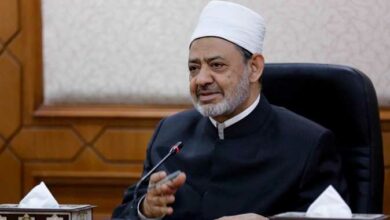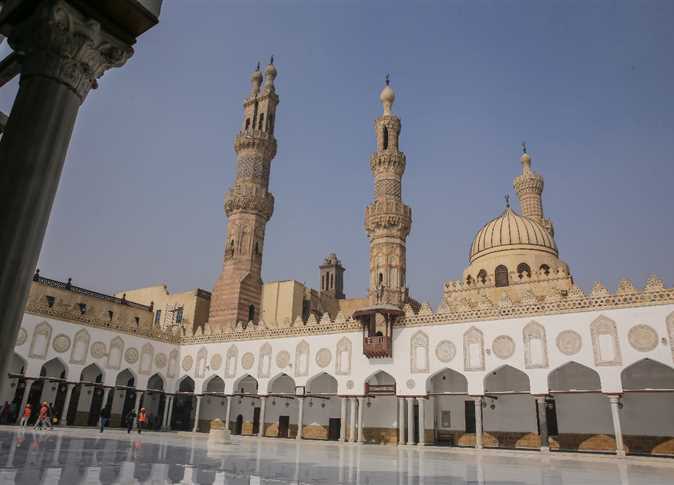Let us start with the good news: the unveiling, a few days ago, of a blueprint for what the new Egypt should look like by Sheikh al-Azhar Ahmed al-Tayyeb is a positive development. Like a similar proposal by the head of National Association for Change (and prospective presidential candidate) Mohamed ElBaradei the previous week, it sets out a picture of Egypt as a modern state governed by the rule of law, with freedom of worship and basic human rights for all.
While confirming Islam as the religion of the state and Sharia law as a reference for legislation (in the widest sense possible rather than the narrow and literal one espoused by some Islamists who would like, say, the return of stoning for adulterers), it stresses the rights of non-Muslims, their equality before the state as well as their right to have their own personal status laws, as is currently the case.
It's a decent compromise, and that Sheikh al-Azhar should embrace it suggests it will appeal to a broader range of Egyptians that Mohamed ElBaradei, with his reputation as a liberal, could hope to reach. If this document receives widespread endorsement (and the early signs are positive), the debate between "Constitution Firsters" and "Election Firsters" may soon be resolved.
Now here's the bad news: even if a broad agreement on basic rights is sealed, the government is running pretty late with setting the rules for the coming elections. There is still little acknowledgment that the current divisions stem from the military's rush to hold the 19 March referendum and the poor legal process it established.
The "Constitution First" debate would never have emerged had the referendum and its aftermath not been sloppily handled, most notably with the establishment of a constitutional declaration (rather than an amended constitution) that went way beyond the nine articles the public had approved. To be quite frank, I find it unbelievable that the constitutional committee headed by Tareq al-Bishri and in which many senior judges participated backed such a sloppy process, even in extraordinary times. The initiatives by ElBaradei and Sheikh al-Azhar are in many respects now repairing the damage created by their unnecessary, avoidable mess.
Whether the constitution or elections come first, the process by which they are conducted must be irreproachable. In the (unlikely) case a constitution is worked out first, those in favor of this scenario have still not explained who would write it and how they would be selected – appointment or election – and how they would reconcile this with the amendments passed in March.
Even the current constitutional declaration (which assumes elections will take place first) leaves some doubt as to whether the constituent assembly, which is supposed to be appointed by parliament, will consist of elected officials, other persons, or both. Another unanswered question is whether the completion of its mandate – i.e. the promulgation of a new constitution, presumably by another referendum – will entail the dissolution of parliament and/or the presidency and new general elections.
If the elections come first, as expected, there are a series of procedural issues to resolve to ensure they are the freest and fairest in Egypt's history. What, beyond finger-staining, will prevent voters from voting in more than one polling station? Will electoral rolls be purged of errors and updated? If, as expected, only a national ID is necessary for voting, will there be a system to ensure that an individual with a particular ID number only gets to vote once? Since judicial supervision is necessary to conduct the elections, and there aren't enough judges in Egypt to hold the elections in a single day, what will be the schedule for the poll? What preparations are being made to accommodate what is expected to be a record number of new voters? Will there be any redistricting, and if so who will decide upon it? When will the Higher Election Commission be appointed to address these important questions, and what resources will be at its disposal?
The complexity of these questions – not to mention that of the electoral system proposed by the Sharaf government, which proposes that one-third of parliament be elected under a list system and the remaining two-thirds under the old single-member district system – makes one really worried, particularly as (let me repeat it again) there are less than three months left before the schedule elections, which includes the annual holiday period, the slowdown that comes with Ramadan, the long break around Eid al-Adha and the opening of a new school year.
It seems almost inevitable that unless these questions are quickly addressed and the electoral system is simplified, the poll will be postponed at least two months. It remains possible that the SCAF, despite its pledge to stick to its schedule, will do just that — for instance by declaring the beginning of nominations and registration for electoral candidates in September, but only holding the poll a month or two later.
This will no doubt generate more grumbling for those rightly yearn for a return to civilian rule, but it's hard to see how serious elections are possible otherwise. Tunisia just postponed its election of a constituent assembly (which would have been the right model to follow in the first place) by three months, with officials saying they needed more time to clean up a notoriously fraudulent electoral system. It is high time that their Egyptian counterparts begin to take a serious look at their own much-abused system so that the next elections will be the polar opposite of the banana republic-style ones that took place in November 2010.
Issandr El Amrani is a writer on Middle Eastern affairs. He blogs at www.arabist.net.




